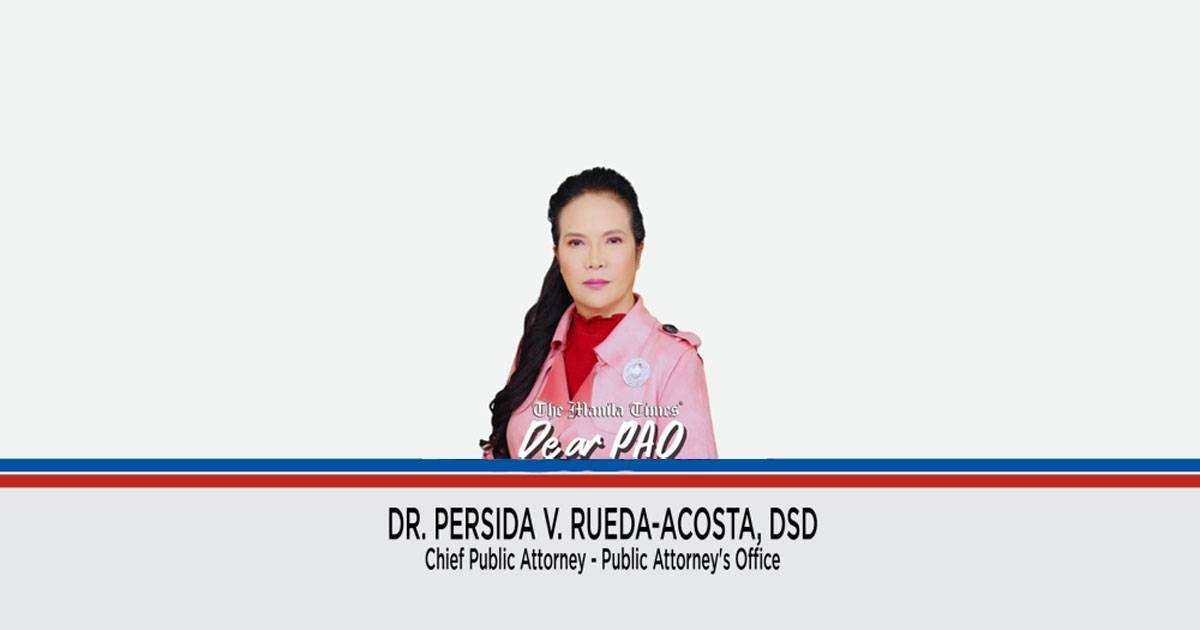
Dear PAO,
I saw the problem of Z, a passenger of a public utility bus involved in a road accident, in an online video. Z claims that he suffered bodily injuries, among others, due to the accident and wants to file a case against the bus owner. Allegedly, the representative of the bus company told him that they were not liable for his injuries because there was a fortuitous event, as there was a storm at the time of the accident. Is there a specific law that exculpates a person or a company because of the so-called fortuitous event? Is that an absolute rule?
Olan
Dear Olan,
The legal provision which discusses the concept of fortuitous events is Article 1174 of the New Code of the Philippines. To be certain, the law provides:
“Art. 1174. Except in cases expressly specified by the law, or when it is otherwise declared by stipulation, or when the nature of the obligation requires the assumption of risk, no person shall be responsible for those events which could not be foreseen, or which, though foreseen, were inevitable.” (Emphasis supplied)
As can be gleaned from the foregoing provision, the general rule is that no person, whether natural or juridical, may be held liable for fortuitous events or those events which could not be foreseen, or which, though foreseen, were inevitable. However, based on the same provision, a person may be held liable for fortuitous events if: (1) the same is expressly specified by the law, (2) it is declared by stipulation of the parties to a contract, or (3) the nature of the obligation requires the assumption of risk.
Aside from the three (3) mentioned exceptions, jurisprudence has likewise declared that persons can be held liable for injuries brought about by a fortuitous event if they have contributed, by their own acts or omissions or that of their employees’ acts or omission, to the occurrence of the untoward incident. As explained by the Supreme Court, through then associate justice, who later became chief justice, and now Executive Secretary Lucas Bersamin:
“A common carrier may be relieved of any liability arising from a fortuitous event pursuant to Article 1174 of the Civil Code. But while it may free a common carrier from liability, the provision still requires exclusion of human agency from the cause of injury or loss. Else stated, for a common carrier to be absolved from liability in case of force majeure, it is not enough that the accident was caused by a fortuitous event. The common carrier must still prove that it did not contribute to the occurrence of the incident due to its own or its employees’ negligence. We explained in Schmitz Transport & Brokerage Corporation v. Transport Venture, Inc., as follows:
“In order to be considered a fortuitous event, however, (1) the cause of the unforeseen and unexpected occurrence, or the failure of the debtor to comply with his obligation, must be independent of human will; (2) it must be impossible to foresee the event which constitute the caso fortuito, or if it can be foreseen it must be impossible to avoid; (3) the occurrence must be such as to render it impossible for the debtor to fulfill his obligation in any manner; and (4) the obligor must be free from any participation in the aggravation of the injury resulting to the creditor.
“[T]he principle embodied in the act of God doctrine strictly requires that the act must be occasioned solely by the violence of nature. Human intervention is to be excluded from creating or entering into the cause of the mischief. When the effect is found to be in part the result of the participation of man, whether due to his active intervention or neglect or failure to act, the whole occurrence is then humanized and removed from the rules applicable to the acts of God. (Bold underscoring supplied for emphasis)x x x
“Even assuming the seaworthiness of the M/V Princess of the Orient, the petitioner could not escape liability considering that, as borne out by the aforequoted findings of the BMI, the immediate and proximate cause of the sinking of the vessel had been the gross negligence of its captain in maneuvering the vessel.” (Sulpicio Lines, Inc. v. Napoleon Sesante, now substituted by Maribel Atilano et al., GR 172682, July 27, 2016)
Accordingly, the bus company may be held liable for the injuries sustained by Z if Z can establish that there is a stipulation in their contract of carriage wherein the company assumed liability even during instances of fortuitous events, if the nature of the obligation to transport Z as a passenger is such that there was an assumption of risk on the part of the bus company, or if the acts or omissions of the bus company or its employees have contributed to the occurrence of the accident which ultimately led to the injuries sustained by Z.
We hope that we were able to answer your queries. Please be reminded that this advice is based solely on the facts you have narrated and our appreciation of the same. Our opinion may vary when other facts are changed or elaborated.
Editor’s note: Dear PAO is a daily column of the Public Attorney’s Office. Questions for Chief Acosta may be sent to [email protected]







